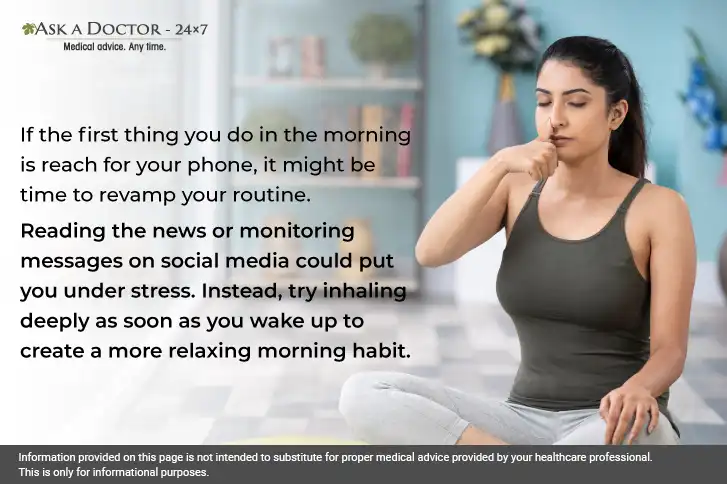Daily Routine For Best Mental Health
Your mental health influences your daily thoughts, feelings, and behaviors. It also has an impact on your capacity to manage stress, overcome obstacles, forge relationships, and bounce back from life's disappointments and misfortunes. Good mental health is crucial as it affects all aspects of one's existence, including general health and quality of life, and it goes beyond simply being free from mental disease. It may also influence how you respond to challenging circumstances. If you don't take care of your mental health, things can get out of hand and cause issues in every area of your life.
Learn some practical tips to build a daily routine for mental well-being that will help you feel happy, and content, and live in a positive mind state. Read on...
Daily Routine for Good Mental Health

Self-care can play a role in maintaining your mental health and can help support your treatment and rehabilitation. Daily self-care practices, no matter how tiny, can make a tremendous difference.
Here’s how you can build a self-care daily routine for good mental health:
1) Maintain a regular sleep schedule
Sleep is essential for both physical well-being and our mental health. We all must get eight hours of sleep every night to feel well-rested and do our daily tasks at their best. Also, the quality of sleep is equally important as poor sleep can exacerbate symptoms related to mental illness.
Try doing these routines to start obtaining enough restorative sleep:
- Make an effort to go to bed and wake up at a fixed time each day.
- Stay away from caffeine after 3 p.m.
- Transform your bedroom into a calm, peaceful, and clutter-free area.
- Try to maintain a temperature of about 65°F (18.3°C) in your bedroom.
- Consult your doctor to rule out sleep disorders like sleep apnea and restless leg syndrome.
A sleep specialist can provide further information about beneficial evidence-based therapies, such as cognitive behavioral therapy for insomnia if you believe your sleeping problems may be related to a sleep disorder.
2) Enjoy nutrient-dense foods
Your mental health may also be impacted by certain diets. Follow these self-care tips to eat healthy:
- Eat more nutrient-dense foods to elevate your mood and promote better mental health. Fill your plate with foods such as whole grains, fruits (berries and bananas), nuts, legumes, and fatty fish, such as salmon, etc. Compared to "unhealthy" eating patterns, try considering healthy" eating patterns like the Mediterranean diet, which is linked to improved mental health. In the Mediterranean Diet, one needs to increase daily intake of fruit and vegetables, whole grains, legumes, nuts, fish, white meats, and olive oil.
- Consume protein-rich foods for great brain functions. and overall mental well-being. Amino acids present in meats, milk, other dairy products, and eggs are high as compared to plant-based protein found in legumes, grains, beans, and peas.
- Drink a lot of water throughout the day. When you're dehydrated, your body and brain get deprived of the nutrients needed to survive and function.
3) Engage in mindful meditation
Individuals who are depressed frequently feel and think badly about themselves. Sometimes it is difficult to overcome these, which is why the mind can greatly benefit from a healthy morning routine. Specifically, mindfulness meditation is a highly effective method for lowering stress and anxiety as well as interrupting depressive episodes.
Your brain can be trained through meditation to maintain focus and reach the same level of concentration even when negative ideas, feelings, or sensations interfere during stressful situations. You can learn to let go of concerns about the past and anxiety about the future by making time to meditate every morning. Most significantly, mindfulness meditation will help you improve your happiness and sense of well-being.
4) Get regular exercise
Exercise not only extends your life and enhances your physical health, but it can also greatly increase your sense of well-being. Walking for just 30 minutes a day can have a positive impact on your health and happiness. We should stretch as soon as we wake up, as after lying down for hours, our bodies ache to move. Also, try a rhythmic exercise that engages both your arms and legs, such as walking, running, swimming, weight training, martial arts, or dancing.
Frequent morning exercise can improve your energy levels throughout the day and work as a potent mental health treatment for disorders including attention-deficit/hyperactivity disorder (ADHD), anxiety, and depression.
5) Stay positive and cultivate thankfulness
It's as crucial to remember that you have gratitude in your life as it is to maintain a balanced diet and exercise routine. When life is getting you down, gratitude is a fantastic approach to keep a positive outlook on things. Every day, set aside some time to reflect on your blessings and record them in writing for future reference. Even in the worst of times, maintaining an optimistic view of life can greatly improve your mental health.
You'll be well ahead of the stress that can try to drag you down every day if you heed these guidelines. But if you ever find yourself having a hard time getting by in life and you're depressed, get treatment right away.
6) Connect with New People
Be aware that cultivating a healthy relationship is crucial to your mental health. Good connections can do wonders, such as:
- Assist you in developing a feeling of value and belonging.
- Provide you with a chance to talk about satisfying experiences.
- Offer emotional support and let you help others.
Learn Ways to Make Good Social Connections
Speak with a reliable person you trust: Feeling heard and supported might come from confiding in a trusted person. It might be a family member, friend, or partner. Alternatively, you might give a call to a listening service or state-run helpline for mental wellbeing. Saying aloud how you are feeling can sometimes be a helpful first step.
Try seeking out peer assistance: It can occasionally be helpful to chat with others who are experiencing similar emotions or situations if you're having trouble. This could take place in a community or in person in a peer support group.
Be a joiner: Join networking, social, or special interest groups that meet regularly. These groups offer wonderful opportunities for meeting people with common interests.
Conclusion
Hence, being in good mental health simply goes beyond not having any mental health issues. You can boost your mental health by maintaining a regular sleep schedule, eating a nutrient-rich diet, practicing mindfulness, connecting with people, and regular exercise. If you are worried about something, and it is continuously hovering over your mind and stressing you, then make sure to talk to your doctor, as s/he can refer you to a licensed mental health practitioner (psychologist or psychiatrist) who can assist you in determining the best course of action.
If you have any questions related to mental health issues, you can Ask a Psychologist at Ask a doctor, 24x7.
Recently Answered Questions Related to Mental Health
- How To Improve Presence Of Mind?
- Suggest a Diet With Nutritional Supplements For Weakness of the Body And Mind
- Headache, Stress On Body And Mind, Diet And Nutrition To Increase Weight
- How To Control Mind?
- What Causes Vomiting In A Person With Dementia And Alzheimer's Disease?
- Can Alcohol Abuse Cause Dementia?
- What Are The Differences Between Dementia And Alzheimer's Disease?
- Does Gabapentin Cause Dementia Like Side Effects?
- Does Dementia Progress To Alzheimer's Disease?
Disclaimer: Information provided on this page is not intended to substitute for proper medical advice provided by your healthcare professional. This is only for informational purposes.
Ask a Specialist
Recent Questions


